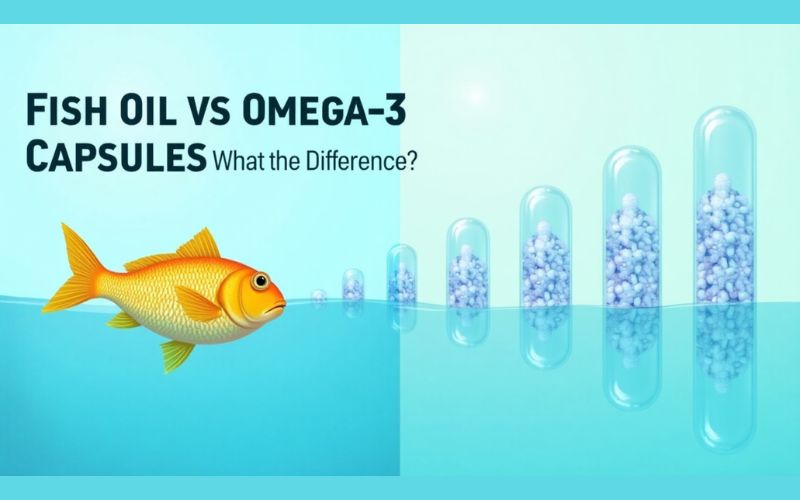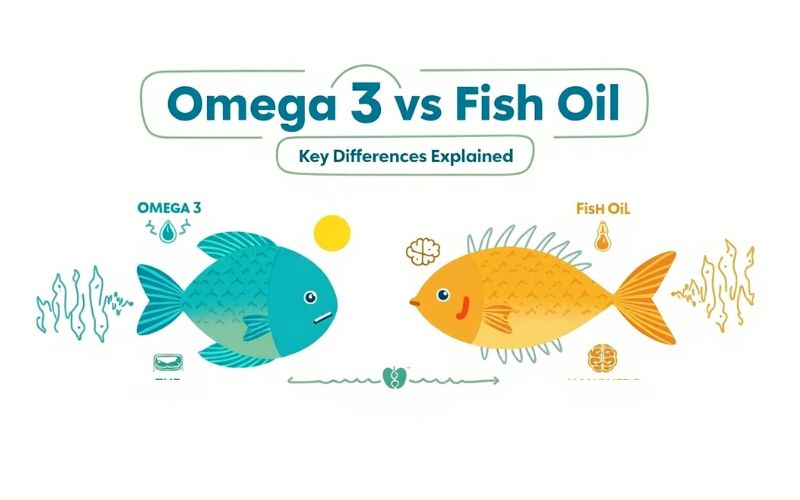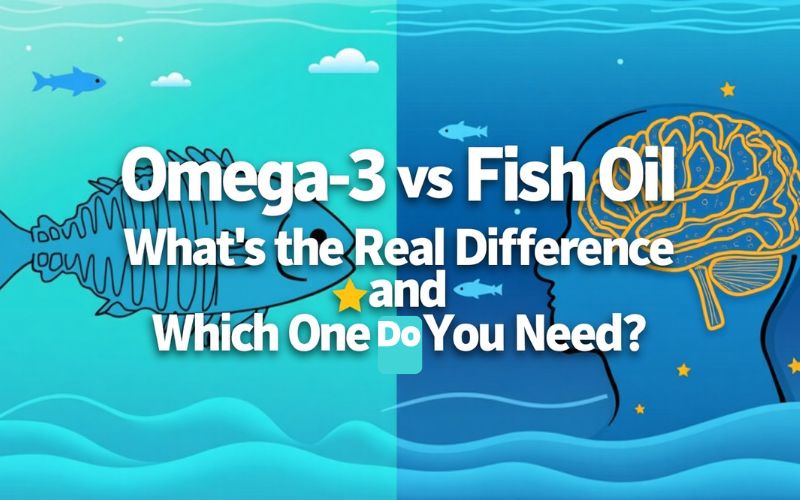When it comes to choosing a supplement for heart, brain, and overall wellness, fish oil and omega-3 capsules are often used interchangeably—but are they really the same? Not quite.
Although both aim to deliver essential fatty acids, there are key differences in composition, potency, source, and health benefits. Understanding these distinctions can help you make a smarter and more effective choice for your health.
Let’s break down the difference between fish oil and omega-3 capsules, and how to choose the one that best suits your needs.
Table of Contents
What is Fish Oil?
Fish oil is a natural extract derived from the tissues of oily fish like mackerel, tuna, salmon, and sardines. It contains a mixture of:
- Omega-3 fatty acids (EPA and DHA)
- Other fats and triglycerides
- Minor vitamins like A and D (depending on the type of fish)
Fish oil is a raw source, meaning it’s not always standardized for omega-3 content unless specifically refined.
What Are Omega-3 Capsules?
Omega-3 capsules, on the other hand, are formulated supplements designed to deliver concentrated and purified amounts of EPA (Eicosapentaenoic Acid) and DHA (Docosahexaenoic Acid)—the two most beneficial types of omega-3s.
They are often extracted from fish oil but go through additional processing to ensure:
- Higher omega-3 concentration
- Removal of unwanted fats and toxins
- Standardized dosages
In short, all omega-3 capsules are made from fish oil (unless plant-based), but not all fish oil is purified or standardized enough to be labeled an omega-3 supplement.
Key Differences Between Fish Oil and Omega-3 Capsules
1. Concentration of Omega-3s
- Fish Oil: Contains lower and variable amounts of EPA and DHA.
- Omega-3 Capsules: Offer a higher, more consistent dose of EPA and DHA per capsule.
If you’re taking supplements specifically for omega-3 benefits for heart and brain health, omega-3 capsules provide better value per dose.
2. Purity and Quality Control
- Fish Oil: May contain impurities, heavy metals, or environmental toxins if not purified.
- Omega-3 Capsules: Often go through molecular distillation and third-party testing for safety.
Always check labels for “purified,” “molecularly distilled,” or “third-party tested” before buying.
3. Form and Ease of Use
- Fish Oil: Available in both liquid and softgel forms; the liquid form may have a strong fishy taste or odor.
- Omega-3 Capsules: Easy to take, tasteless softgels; some are enteric-coated to prevent fishy burps.
4. Specific Health Benefits
Fish oil may contain additional nutrients like vitamin A and D (especially in cod liver oil), which could benefit immunity and bone health. Omega-3 capsules, however, focus purely on EPA and DHA benefits—ideal for heart, brain, eye, and joint health.
5. Cost and Accessibility
- Fish Oil: Generally more affordable but less potent.
- Omega-3 Capsules: Slightly more expensive due to higher purity and standardized EPA/DHA content.
Which One Should You Choose?
Your choice depends on your health goals, dietary preferences, and budget.
Choose Fish Oil If:
- You’re looking for a general health supplement
- You want a more natural or budget-friendly option
- You’re okay with a lower omega-3 concentration
Choose Omega-3 Capsules If:
- You need targeted support for heart, brain, or joint health
- You prefer a consistent dosage of EPA and DHA
- Purity and quality are your top priorities
Common Misconceptions
Myth 1: Fish oil and omega-3 are the same thing
Truth: Fish oil is the source; omega-3 capsules are a purified form of it.
Myth 2: You don’t need omega-3 if you eat fish once a week
Truth: Most diets don’t provide enough EPA and DHA from food alone. Regular supplementation helps maintain optimal levels.
Myth 3: All omega-3s are equal
Truth: Only EPA and DHA from marine sources provide proven cardiovascular and brain benefits. ALA from plants must be converted—and the conversion rate is very low.
FAQs
Are omega-3 capsules better than regular fish oil?
Yes, omega-3 capsules usually offer higher EPA and DHA content, are more purified, and come with consistent dosages—making them a better choice for targeted health support.
Can I take both fish oil and omega-3 supplements?
It’s not necessary and may lead to excessive intake of fats. Choose one based on your needs, preferably a high-quality omega-3 supplement.
Do omega-3 supplements cause any side effects?
Mild side effects may include fishy burps or upset stomach. These can be avoided by taking capsules with food or choosing enteric-coated options.
Are there plant-based omega-3 capsules?
Yes, algae oil is a vegan source of EPA and DHA and is ideal for people who avoid fish products.
Final Thoughts: Choose Smart for Better Health
While fish oil and omega-3 capsules are closely related, they serve different purposes. If your goal is general nutrition, fish oil may be sufficient. But if you want concentrated support for your heart, brain, and joints, omega-3 capsules are the smarter and more effective choice.
Want to explore high-quality fish oil and omega-3 supplements in Pakistan? Visit Nutritional World and discover trusted brands, competitive prices, and fast delivery nationwide. Take the guesswork out of your wellness journey—your body and mind will thank you!


























